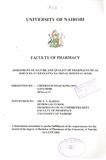| dc.description.abstract | The nature and quality of pharmaceutical services in very healthcare facility determines to a great extent
whether the facility achieves its objective of provision of quality and efficient healthcare.
It was found out that in KNH more than 80% of pharmacists participate in inpatient dispensing, clinical
pharmacy service, drug information and outpatient dispensing.55%of pharmacists participated in
cytotoxics reconstitution .Less than 50% participated in manufacturing ,preparation of specifications 111
drug purchase, pharmacy and therapeutics committee, and dispensing of narcotics. None ofthe
pharmacists participated in total parenteral nutrition.
Stock cards were used in stock management in all the pharmacies. Stock inventory was done at least
once weekly in 88% of pharmacies. Stock inventory minimizes the expiry of drugs.
Adequate, refrigeration, lockable cabinets, dispensing space, electricity supply was present in all
pharmacies. Adequate compounding equipments were absent in all the pharmacies.
Drug arrangement is an important component of stock management. The generally accepted
arrangement based on pharmacology was found in 69% of pharmacies. Interestingly 77% of pharmacies still
had arbitrary arrangement of some drugs.More than 40% of pharmacies inspected the ward drug stores at
least once a month.
Only 22% of pharmacists participated in ward rounds daily. Although they offered clinical pharmacy
service, there was no mode of documentation that can be verified that was in place.
Effective drug information service requires a reliable source of information such as textbooks,
journals and Internet. All the pharmacies visited had no textbooks of therapeutics or pharmacy practice.
I
More than 50% of pharmacists visited the Internet weekly.
Cytotoxic reconstitution had the highest daily participation of pharmacists (87.5%) attendancies of
ward rounds (100%) and an impressive rate of pharmacist evaluation of patients (50%). Only 25% of
pharmacists felt well protected from cytotoxics.
In many hospitals TPN services are provided as part of clinical pharmacy service. In KNH
pharmacists do not participate in this critical service.
A manufacturing unit exist with a pharmacist in charge. It lacks a quality control lab. Currently it is
not in operational
63.6% of pharmacists participated in the preparation of specifications for purchase of drugs.
Quotation, tendering and direct purchase were the methods of purchase. 57% of personnel felt the method
were efficient. Analytical testing (periodically) of procured drugs is not done.
A pharmacy and therapeutic committee has been revived. Most of the personnel interviewed were
not aware of its existence.
Good records of narcotics dispensed as well as their accounting was well-done. However, auditing of
these narcotics was not done in over 50% of pharmacies.
Apart from coartent most of pharmacies felt that drugs available were sufficient.
,
Only 37.5% of pharmacists and 25% of ph arm tech were aware of good dispensing practices. | en_US |
| dc.description.department | a
Department of Psychiatry, University of Nairobi, ; bDepartment of Mental Health, School of Medicine,
Moi University, Eldoret, Kenya | |

